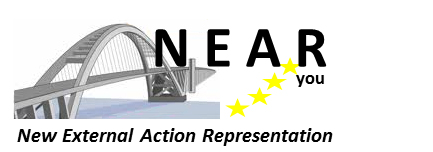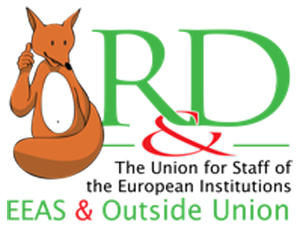 |
 |
List supported by R&D, SFE, RS USHU/U4U
gathering together to be more efficient
Vote for unity !
New External Service – meeting the challenges
Raison d’être of the EEAS
The EEAS assists the High Representative who conducts the Union’s common foreign and security policy. The HR is in charge of proposing the development of that common policy. The EEAS helps the High Representative ensure the consistency and coordination of the Union’s external action as well as prepare policy proposals and implement them after their approval by Council. The EEAS works in cooperation with the diplomatic services of the Member States.
It is therefore essential that processes are put in place for the co-ordinated development of such policy proposals and, after their approval, for a co-ordinated implementation in all of their aspects, meaning actions undertaken by the EU as a whole (EEAS, Commission, Council and Member States when they act within the framework of these policies).
Effective communication of decisions, objectives but also of reports and policy evaluations is essential if the EU is to speak with one voice.
The EEAS is a European Civil Service, supporting the development of a highly sensitive new area of European actions. European officials are the backbone of this Public Service. NEAR will serve the interests of staff rightly concerned about their future in this new structure – everything will be done so that these interests are defended in the best possible manner.
The philosophy behind our program
| Defending an independent, high-quality European Civil Service. The EEAS is the diplomatic service of the EU. It has to fully respect the rules applicable to a European Public Service. This is the pre-requisite for its necessary independence in the European interest. | |
| Solidarity and non-discrimination of all EEAS staff. The coherence of staff is a major goal to be achieved, eliminating all unnecessary distinctions and petty discriminations. A common implementation on the statute across all institutions should create a common basis for all personnel in delegations regardless if they are from the EEAS or the Commission. | |
| We do not accept precarity. Contract agents should have access to internal competitions. We reject the proposal that secretaries will only be recruited as Contract agents. The situation of Local agents must be vastly improved. | |
| The EEAS is part of the European family of Institutions. This is why close contacts, in particular with the Commission, must be maintained with a view to ensuring coherence of policy objectives, proper coordination of programs and actions on the field. | |
| The EEAS is also part of the European diplomacy. Relations with national diplomatic services have to be fluid (training, secondments, …). | |
| The reform of Staff Regulation will affect everybody and may have a disproportionate effect on the EEAS. There is a need to coordinate closely the response of all trade unions from all institutions to this threat. |
NEAR will fight against arbitrary decisionsThe EEAS, created in the beginning of this year, is already in the middle of a screening exercise aimed at making 10% savings. This speaks volumes about the management skills of the decision-makers. NEAR will push for a due and fair process, according to the Staff regulations:
Staff coming from the CouncilNo discrimination in working conditions and career development. Their experience is an important asset to the EEAS. Guaranties must be applied to avoid discrimination with their different evaluation system and attestation procedure. Maintaining their access to the Council crèche. A vade-mecum on the intranet should explain the main processes relating to staff administration and identify contact points, helping them in daily administrative problems. Staff coming from the MS’ administrationsStaff coming from Member States should enjoy the same rights as EEAS Staff in all aspects of their working conditions. END should have voting rights to the Staff committee, after 2 years. OfficialsMitigation of the disparities in career development created by the 2004 Staff Regulations, in particular through the organization of internal competitions. Establishing a clear career development path for EEAS staff (AD & AST), including rotation of postings abroad and in HQ, change of geographical zones. Experience in a delegation must be an eligibility criteria for management posts. Accelerating the pace of career advance in an objective and transparent way. Enhancing the prestige of jobs and responsibilities of colleagues who do not hold managerial posts, but who form the very foundation of the effective functioning of the EEAS. Ensuring the use of the list of successful candidates after certification in order to cover AD posts Clarification of the ASTs’ career, who should have clear career development perspectives, without artificial ceilings. Establish an EEAS attestation procedure which permits to improve the AST’s career prospects. Safeguarding the secretary category. Assistants having a management role in delegation should be recognized and offered a full career growth. Limiting forced mobility to a number of sensitive posts. Prepare staff for future responsibilities and duties with quality training and guaranteeing better access to training. Represent staff concerns during all the stages of the EPSO selection board and selection panels, to ensure that these kept fair and in fully transparent. Put an end to the ‘twelve years Outside Union‘ from the status and favorize the nomination of the best-suited persons without taking care of the priority 1 or 2. |
NEAR will fight for improvements to the working environment :
Staff of the EEAS should have at least the same working conditions as their previous institution and not less (good point of contacts of Commission services like PMO, Social service, training unit, security service etc.) Implementation of Human Ressources policies in DelegationsNEAR will push for improvements the following areas: a) Full respect of Health and safety policies; b) Best possible medical coverage of all staff in Delegations and Head Quarters; creation of an own EEAS medical service, able to deal with the specific needs of the EEAS staff working around the world and facing special risks c) Correct implementation of Flexitime ; some Heads of Delegations actively discourage the use of flexitime policy and impose restrictions, which are not in line with HR policies. NEAR objective is to make flexi-time work in all delegations. d) Application of parental leave to all staff in delegations e) Monitor the proper implementation of training policies in Delegations. f) Unmarried couples should not be bound by local law for allowances: equal benefits should be granted upon a self-declaration. NEAR will demand a transparent promotion and evaluation process in the line with annex II of the statute, meaning 85% of the personnel should have a normal career Management positions in Delegations should be recognized as ‘prior management experience’ for accessing to management posts in HQ. Administration sections in Delegations are overburdened and would enjoy real and adequate support from HQ. They should be properly staffed and expertise needed for the requested tasks should be recognised by the creation of AL Group 1 posts. HoA having been certified should be able to stay on an AD post. Security in delegation should be treated seriously. LSO should have access to more training, the training programme being adapted to local circumstances (petty criminality, urban violence, ). Ensure the follow-up of the MDR/A.40 Infrastructure division reports onSafety and Health in Delegations. Offer support to HoA for writing and managing the call for tenders aiming at revamping the offices. Foresee a budget for CP members who have to visit delegations, as part of their duties. |
Building a true European Public Service spiritNEAR will push for building a common identity where all EEAS staff will enjoy equality of chances.
Unite forces with other institutions
NEAR will ask for rules aiming at reinforcing a common Public Service spirit :
Contract AgentsNEAR will advocate and support any initiative pursuing improvements in the following critical matters: Career structure: Current recruitment and employment rules for posts in delegations do not foresee any career development perspective, prohibit reassignments to HQ, lack a rotation mechanism, deny access to internal competitions and establish a disputable reclassification procedure. In this respect, NEAR intends to battle for a modification to the staff regulations and/or their implementing provisions. Professional tasks and responsibilities: In order to clarify the current ambiguous instructions regarding grading, tasks and responsibilities NEAR will demand for an unequivocal re-definition of professional requirements, tasks and responsibilities. Such an exercise will also include a steady follow-up on the disputes regarding equal work – equal pay, and permanent contracts for permanent posts. Rotation and work in HQ: NEAR considers negotiations on the rotation policy for CA an absolute priority. The whole exercise may become unmanageable given that currently EEAS CAs cannot be posted to HQ. It is necessary to re-negotiate the regulations in this respect. Access to internal competitions must also be allowed. Recruitment grades for Delegation posts must be identical to recruitment grades applied to posts in HQ. Equally, Contract Agents, like Officials, should also be eligible for secondments to the Section and trade unions and need greater representation as they look set to become more numerous in Delegations in the future. Improve rapidity and quality of the union’s assistance in terms of legal, technical and arbitration adviceUntil now, staff in delegations did not have the same access to legal support and advice as their colleagues in HQ. NEAR will push that all possible means to defend staff in delegations including legal support at central and local level are explored. NEAR will quickly react to your requests and provide access to the legal services of the trade unions. Each NEAR candidate is an expert in one or several staff-related matters which assures the union’s capacity to provide quality service to all categories of staff. We see you as our clients and we like to help and support you where needed. |
NEAR will push for concrete actions aiming at developing a common identity but also at making economic quick-wins and reasonable use of the European tax payers money:
Staff coming from the CommissionImplementing the Right of Return of the Staff from the Commission, during two years, as already agreed. Local AgentsImprovement of the working conditions for Local Agents. NEAR fixes as its priorities:
Provident Fund For the coming period, NEAR will ensure that the Administration provides better financial arrangements for the existing Provident Fund. Medical Insurance Scheme Medical insurance Scheme must be improved, in particular:
Proper pension and invalidity coverage Pension and invalidity scheme must be introduced for LAs. Political commitments of the Commission must be fulfilled. NEAR will use all means at its disposal to turn political declarations into reality. Pensions for Local Agents : Transform the lump sum paid at the end of the service in a monthly installment and pay the remaining capital to the family at the death of the beneficiary. Application of the new Method for salary adjustment The old Method was a big step forward in bringing systemic changes to the key exercise. The new one is a further step in the right direction. Though not perfect – and one can hardly expect to develop a single method that will be perfect for more than 130 delegations all at once – the new Method is now agreed, and NEAR will fight to have it in place as quickly as possible and implemented in accordance with the agreed rules. Representation Staff in delegations still do not have appropriate means that would allow them to work effectively as staff representatives. Such effectiveness requires permanent involvement of the elected representatives in the daily work of the trade unions and the CCP. Local agents, representing over10% of EEAS staff and 60% of Commission staff in delegations, should be better represented. Therefore, in order to better perform their duties, elected Local Agents should be seconded to Brussels during their electoral mandate. NEAR will provide specific training and assistance for staff representation in delegations. |
